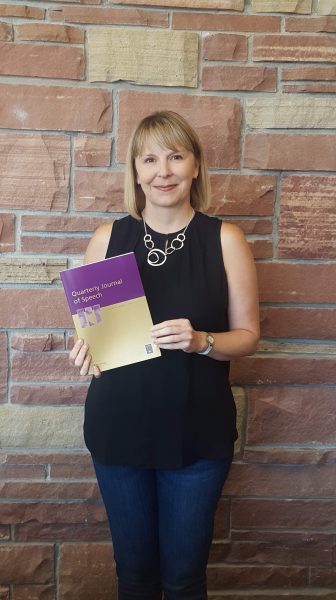The National Communication Association has selected Colorado State University Professor of Communication Studies Karrin Vasby Anderson as the next editor of its Quarterly Journal of Speech (QJS), the most prestigious and oldest peer-reviewed journal published in the field of rhetorical studies. 
According to the journal’s website, QJS welcomes the full array of scholarship produced under rhetoric’s broad purview, including work that advances and enriches longstanding traditions in rhetorical theory and criticism, as well as research and writing that maps new frontiers.
“Essays in QJS run the gamut of assessing presidential speeches to looking at popular culture texts, such as television and film, to scholarship on physical place and space,” Anderson says. “QJS publishes articles that ask, how is rhetoric making meaning in the world? How is it shaping identity or influencing political dialogue or helping us understand and organize our everyday lives?”
QJS is one of 11 journals produced by NCA, which advances communication as the discipline that studies all forms, modes, media, and consequences of communication through humanistic, social scientific, and aesthetic inquiry.
Anderson will be the seventh female editor of QJS since it was founded by the association in 1915. She will replace Mary Stuckey, Pennsylvania State University professor of communication arts and sciences, who has served since 2017. Anderson’s editorial terms runs from 2020 to 2022, although her duties begin in 2019.
As editor, Anderson oversees the peer-review process and makes final decisions on content. She will assign two faculty reviewers per article using a blind review process in which the identity of neither reviewer nor author are disclosed to one another. Reviewers render a judgment of reject, revise and resubmit, or accept, and offer comments that can guide any requested revisions.
Anderson will then read the reviewer comments and the paper and make a final decision on the article’s status—reject, revise and resubmit, or accept—and contribute her own suggestions.
“Editing a journal is meaningful and prestigious service because you really get to shape the discipline,” Anderson says. “Whatever QJS publishes guides the conversation in the field.”
For the first time in the history of the communication studies department, two NCA journals will be simultaneously led by department faculty. Greg Dickinson, professor and chair was elected editor of the association’s peer-reviewed Communication and Critical/Cultural Studies and will oversee volumes appearing between 2019 and 2021.
“To have two NCA journals edited by Colorado State faculty is pretty exciting,” Anderson says. “It’s a sign of vitality. It also speaks well of our graduate program – particularly our new Ph.D. – having two faculty serving in these high profile service roles.”
The editorships also offer professional development opportunities for the graduate students. Dickinson and Anderson each hire one graduate student assistant. They play a critical role in managing the flow of manuscripts through the peer-review process. Once an article is accepted, students also help with citation checking and formatting prior to publication.
I enjoy working with grad students and mentoring them,” Anderson says. “The opportunity to do that with professional colleagues is rewarding.”
Anderson studies the culture of politics and the politics of culture, examining the ways in which political identity is rhetorically constructed and contested in popular media. She is coauthor or editor of three books: Women, Feminism, and Pop Politics: From “Bitch” to “Badass” and Beyond, Woman President: Confronting Postfeminist Political Culture, and Governing Codes: Gender, Metaphor, and Political Identity. She is widely published, blogs regularly, and is consulted as a political communication expert by local, national, and international media outlets.